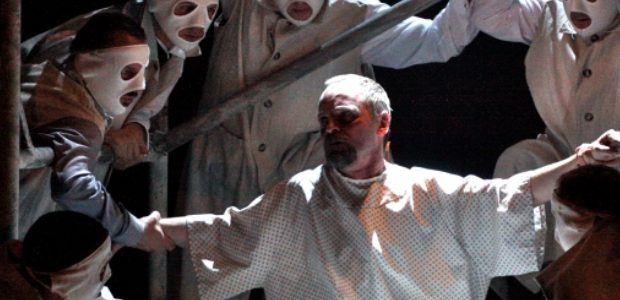With their latest production of Richard III & A Comedy of Errors performed at the Festival Theatre this week, we caught up with Propeller Theatre Company‘s Artistic Director Edward Hall to chat about their unique style of staging and working with an all male troupe:
What can audiences expect from a Propeller production?
They should expect an event as much as going out to see a play. There’s a lot of live music, we’re very physical we like to be very visual. With Richard III we’ve done a few quite outrageous things in this production that I’ve never done on a stage in twenty years so I hope they’ll appreciate it.
Propeller has a unique approach to staging Shakespeare what made you choose to tackle the plays in this way?
It was mixing aesthetics I understood, things that were relative to me, for instance A Comedy of Errors was loosely based on a sort of wild 1980s package holiday island, Costa del Ephesus if you like. So it was mixing references we remembered with classical approaches to the text, speaking the text very clearly, men playing the women, and taking away some of the elements of modern theatre such as recorded music and getting the performers to make as much of the performance experience live, which of course is what they would have done in Shakespeare’s time. So it’s a mixture of things really.
We’ve done a few quite outrageous things in this production that I’ve never done on a stage in twenty years
What benefit does an all male cast give you?
It’s always difficult and one group of men are entirely different from another so you can’t generalise, but it’s quite interesting, in A Comedy of Errors for instance when the two women Adriana and Luciana are discussing how you should behave with your husband, to have a man discussing how you should behave with a man is very ironic, with one of them saying you should do everything a man says and the other saying that’s why you’ve not got a man, you’re too available it has a completely different ring to it with men saying it. It also allows us to be quite naughty which we are in A Comedy of Errors and then in Richard III there’s a toughness to it which there in the play as well as a tenderness.
It’s hard for us because we’ve been doing it to thirteen years so it’s just like acting another part, the novelty has sort of worn off. The actor playing Richard is making as much of a jump as the actor playing Margaret of Anjou, neither of them are that character it’s just one of them is making a gender jump.
Do you think the physicality helps overcomes the barriers people often have with Shakespeare?
It certainly does. It’s all in the name in of clarifying what’s going on on stage and over the years we’ve built up a very young audience and a lot of people who’ve come to see us have never been to see Shakespeare before. It’s critical to us that the stories are clear, and they’re fantastic stories. Shakespeare died a very very rich man and they were very popular pieces. Everything we do on stage is designed to unlock what’s going on, they should be decorated beautifully but essentially everything should have some narrative contribution to help you, the audience, get what’s happening and our job as theatre makers is to deliver and imagine the physical life of the play that enhances the text – because all you have are the words on the page, and we try to bring that to the text so that people don’t have to think about it too hard, but get it fairly quickly.
The actor playing Richard is making as much of a jump as the actor playing Margaret of Anjou, it’s just one of them is making a gender jump
Is there a particular audience you’re looking to reach with the plays?
We get a big mix of people, for instance last week in Norwich we were playing to a thousand people a night and they came from all over the place. Of course Shakespeare’s globe had a mix, rich aristocrats sitting down in the seats and of course the groundlings who loved the plays who were poor and couldn’t read or write. So our audiences are a mixture and I think that reflects the broad appeal of the plays.
The company is also involved in education with Pocket Propeller could you tell us a little about that?
Pocket Propeller are sixty minute versions of our productions featuring about half a dozen actors and it’s all about access, taking it out to young people who’ve not seen the plays before. It’s not just an exercise in seeing Shakespeare it’s an exercise in seeing theatre full stop.
What those young people get is a show performed by actors at the top of their game, a show that’s been played all over the world, a play we really know a lot about and we boil it down to sixty minute versions – a beginning, a middle and end and I think that with that they get the best they possibly can get and don’t think we’re short-changing the audience of tomorrow.


Comments